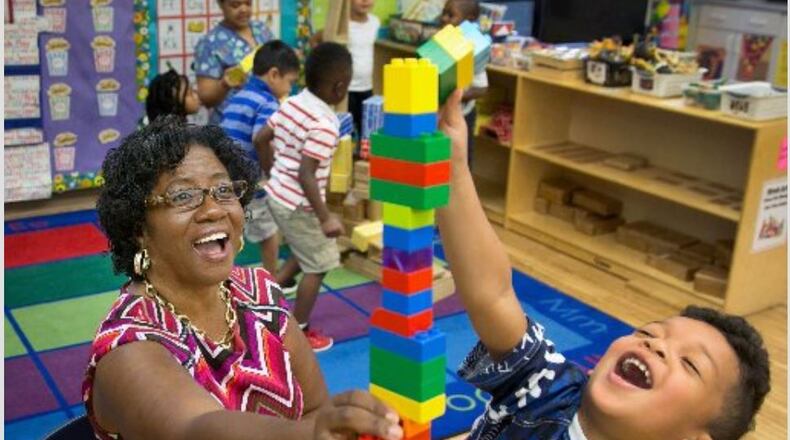Mindy Binderman is executive director of GEEARS: Georgia Early Education Alliance for Ready Students.
In this guest column, Binderman says the majority of reporting child care providers—more than 1,000 across the state—have closed, and more closures might be on the horizon as additional measures are taken to stop the spread of the coronavirus.
She warns we could lose nearly half of our country’s child care capacity by mid-April without government support.
By Mindy Binderman
As the world copes with an unprecedented public health and economic crisis, we are also in the midst of a child care crisis. State and federal leaders must act quickly to support essential workers in need of child care and provide critical financial support to our state’s child care providers if we are to maintain a supply of safe, quality care during this urgent time and into the future.
Doctors, nurses, and other medical workers are on the front lines fighting the COVID-19 pandemic. Personnel with child care needs must now figure out how to cope as most of the nation’s schools, and many of its child care programs, close for the foreseeable future.
The health care sector has some of the highest child care obligations in the United States, and a recent study estimates that single parents constitute 7% of the health care workforce. Other essential workers like grocery and pharmacy employees, first responders, and delivery personnel face a similar dilemma as they continue to work full-time and care for children.
Meanwhile, the majority of reporting child care providers—over 1,000 across the state—have closed, and more closures might be on the horizon as additional measures are taken to stop the spread of the virus.
In a recent survey by the National Association for the Education of Young Children, 30% of child care providers said they would have to shut their doors permanently if they had to close longer than two weeks without significant public investment, and 16% said they couldn't last more than a month. In starker terms, we could lose nearly half of our country's child care capacity by mid-April without government support.
To be able to do their jobs most effectively, essential employees need to know their children are being cared for in a loving, safe environment. Once everyone returns to work, we will depend on child care being there.
Immediate action is needed at both the state and federal levels to alleviate the effects of this child care crisis.
Create a “Critical Child Care Network” in Georgia
Last week, Georgia Gov. Brian Kemp and Department of Early Care and Learning Commissioner Amy Jacobs announced the state would partner with the YMCA of Metropolitan Atlanta to dedicate several of their facilities as child care centers for medical workers. This move was an important step to meet the needs of our frontline staff.
In a letter signed by child care leaders and advocates across the state, GEEARS have urged the state to provide additional support, including additional funding, to ensure essential workers can continue their jobs without disruption from child care challenges.
We recommend the creation of a “Critical Child Care Network” to serve frontline staff, such as hospital workers and emergency responders. This network would allow select child care centers, family child care learning homes, and afterschool programs to remain open to serve frontline staff with full-time or respite care.
The focus should be on enlisting the state’s existing licensed child care sites—centers and family child care homes that wish to remain open and have existing infrastructure and staff in place—as the primary way to provide care for young children of frontline personnel. The participating locations will need to be adequately supported, whether through state funding or emergency federal dollars, with the distribution of assistance handled through existing DECAL channels.
The safety of our children is paramount, as is the health of those caring for them: the child care personnel who are also on the front lines of the nationwide effort to combat this pandemic. We must also consider the proper precautions to put in place to make their work environment safe.
Provide Emergency Funding for the Child Care Industry
The Families First Coronavirus Response Act provided some much-needed stability for young children and their families, such as paid leave and emergency nutritional funding, but more needs to be done to support the child care and early learning sector as a whole.
The entire national network of providers needs a significant amount of new funding to meet the challenges ahead. Child care providers are already operating on very small margins, and many child care providers will face the prospect of shutting their doors.
Immediate emergency funding is required for the industry’s long-term sustainability. Without it, the industry simply will not exist, at least not in the same way it had until a few weeks ago, once parents return to work.
At the state level, we urge Gov. Kemp to use emergency funding to support the industry's needs. Federal lawmakers should also include support for the child care industry within the relief packages working their way through Congress.
The private and philanthropic sectors can also play a role in supplying emergency funds and allowing grantees maximum flexibility to use funding as needed in this rapidly changing environment. And individuals can work to advocate on behalf of the early childhood sector.
The future of child care in this country depends on all of us coming together to act now.
About the Author
Keep Reading
The Latest
Featured



